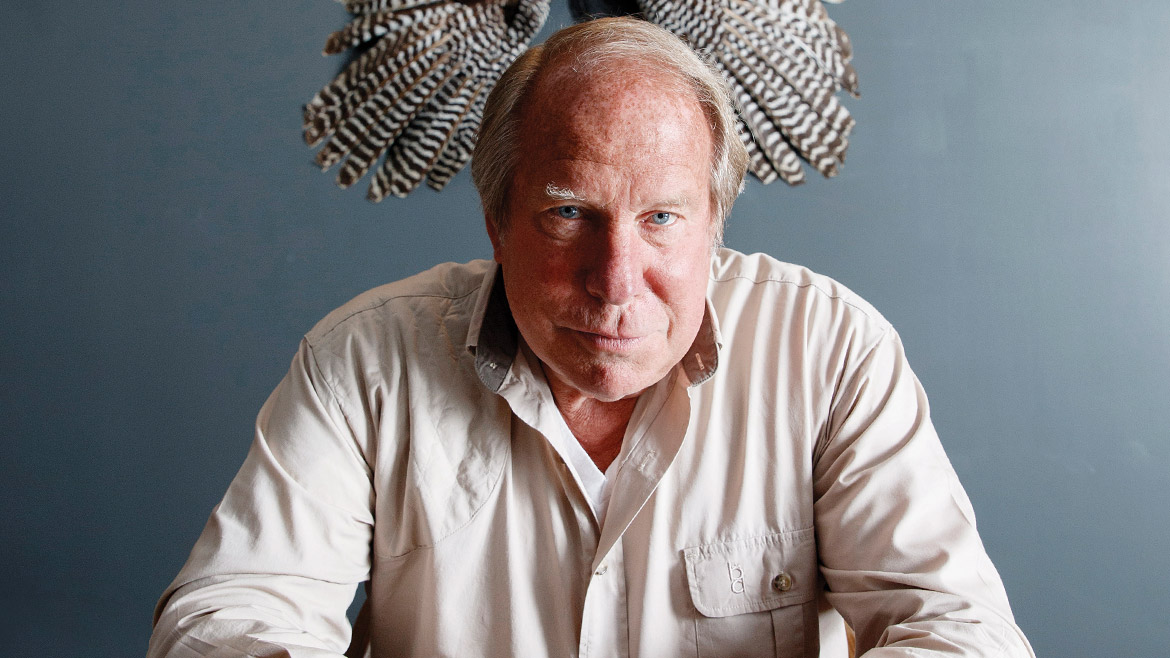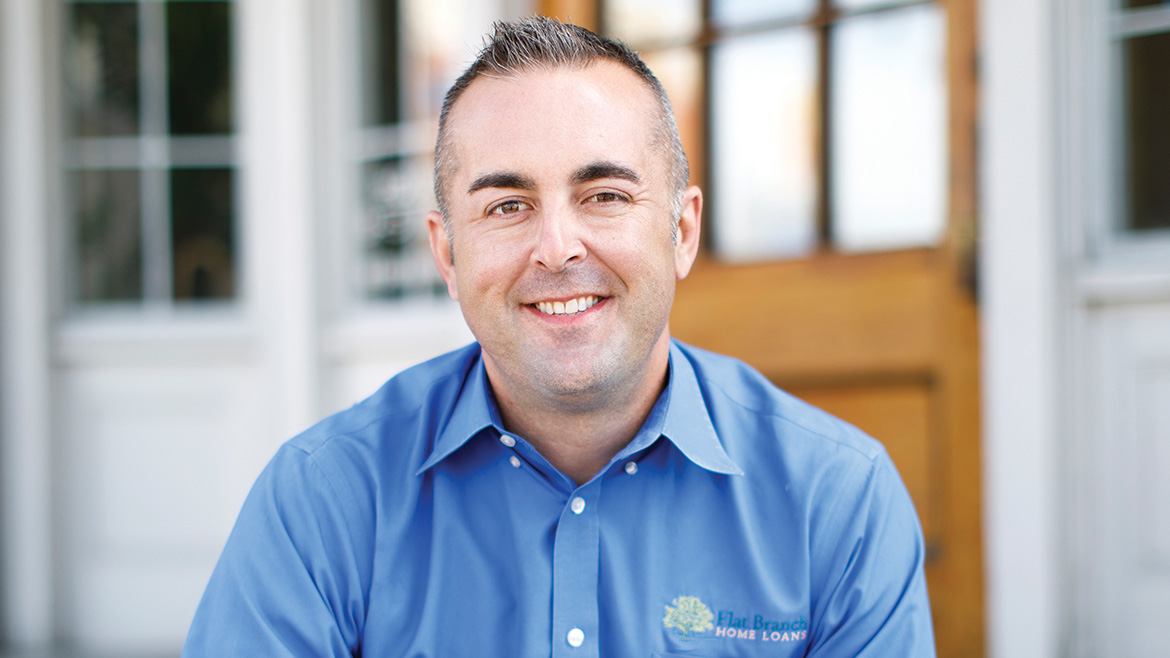A Guiding Hand: Columbia’s Mortgage Lenders Lead the Way
- photos by Keith Borgmeyer

As much fun as it is to discuss such matters on a Friday night out with friends, nothing gets your heart pumping and your blood pressure soaring quite like worrying about your mortgage. For the vast majority of us, buying a home will easily be the biggest expenditure of our entire lives. Whether or not you can pay your mortgage can be the difference between tremendous financial security and comfort or blocking phone calls from debt collectors and counting up your pocket change before going to the grocery store. Even though the subject used to put us all to sleep in our high school economics classes, our mortgage affects basically all other aspects of our lives.
“Nobody ever comes out of school saying, ‘I want to be in the mortgage business!’ Nobody!” jokes Jim Yankee, founder and owner of Flat Branch Home Loans in Columbia. He was 21 when he answered an ad for a job at Monarch Title Co. From there, he went on to work as an assistant loan officer for Wells Fargo before starting Flat Branch in 2005.
“Our goal is to not just get people into homes, but to do right by them — show them what they can afford and walk them through the numbers,” Yankee says. “There’s a lot of regulations and a lot of paperwork, which is frustrating for people, but as long as you have income to support the loan, we can work with you, even if you have past credit issues.”
Columbia’s mortgage lending industry, supported by local operators like Yankee, has weathered trying times to become a stable provider of customer-focused lending in Mid-Missouri. Flat Branch, for example, has developed services like their Community Champions Lending Program, which offers free appraisals to police officers, firefighters, other emergency response staffers, and school employees.
It’s reflective of the community’s wider zeal for customer service. Ralph Gates, founder and owner of Mid America Mortgage, has a passion for making real estate loans. “Nothing gives me satisfaction more than seeing a young couple buy their first home. It may sound stupid, but I get a high off of that,” he says.
Like Yankee, Gates worked in the industry before striking out on his own. He climbed up the corporate ladder in the banking world, but the higher he climbed, the further he felt from the customer. “I figured out what I really like to do is talk to you about buying a house,” he says. So, in 1984 he started Mid America Mortgage, along with co-founder Jeanie Byland, so that he can sit “eyeball to eyeball” with people to help them find the way of owning a home that’s best for them.
Likewise, Reza Abadi, branch manager of USA Mortgage in Columbia, says that he “loves the challenge” of the industry. Abadi says he makes a concentrated effort to have that personal connection with each of his clients. “You have to create trust so that you can best help your clients reach their financial goals,” he says. “It’s all about the relationships.”
Changing Perceptions
After owning a restaurant and working part-time in the mortgage industry, Abadi has been in the business full-time for several years now, and he’s seen his USA Mortgage branch through good times and bad. Remembering the mortgage crisis of nearly a decade ago, Abadi jokes, “For a few years we were less popular than lawyers.”

The collapse in 2007 contributed to a “sharks in suits” stereotype of mortgage lenders: the rich who became richer by manipulating a person’s dream to own a home. Gates, in his more corporate days, even met a few of these people. “I came to find out there is something about the dye from the pinstripe suit that interacts with human sweat and makes a person think they’re better than somebody else,” he says. “Consequently, I never found a suit that would fit really well.”
He now strives to make his business as down-to-earth as possible, a quality he shares with Yankee and Abadi. Gates has no computers in his office — peculiar in the industry at a time when more people are going online to find a home loan from websites like Rocket Mortgage and Quicken Loans. Even people who still use brick-and-mortar companies now go online for a lot of the application process. “We’re investing heavily in our web presence,” Yankee says, “especially with more millennials buying homes. But even older generations expect to do more online.”
Local lenders now have to convince potential customers of the advantage to going into a stranger’s office and filling out paperwork outside the comfort of their own homes. Their main selling points are personal service and lower pricing. Gates says, “Go online and get a good-faith estimate from any of the online mortgage services, and then take that estimate to any bank or mortgage outfit here in Columbia, and I think you’ll find that most of the places here can beat the rates you find online.”
“When you compare the rate you get online with ours, you’re going to save some money if you get your loan locally,” Yankee says. “Also, nine out of 10 of the online places offer terrible service.” He says service might not be too much of a problem if you’re refinancing, but if you’re buying a home and trying to coordinate moving trucks and all your family and friends who are helping you move, the last thing you want is bad customer service making an already stressful process even more nerve-wracking.

But mortgage companies don’t just compete with online brokers — they also compete for customers with local banks. “People trust their local banks more than the mortgage bankers or mortgage brokers,” says Abadi. “But the only thing mortgage companies do is mortgages. We don’t do CDs, deposits, auto loans. Also, we have more mortgage products and more mortgage options than banks because that’s all we do — and since that’s all we do, we are pretty good at it.”
As the mortgage industry has reemerged after its collapse, nonbank lenders have been capturing more and more market share. The Washington Post reported that non-bank loans among the top ten mortgage lenders went from a market share of 10.9 percent in 2011 to 17.1 percent in 2016. As banks have backed off from home loans in the face of tighter regulations, mortgage companies with more focus and flexibility have stepped in, including Columbia’s local players.
COMO Strong
As in so many other instances, Columbia is a good place to be when it comes to stability of the real estate market.
“The Midwest has always been a safe spot,” Abadi says. “When houses in Nevada were going up $900 per day in appreciation and people were refinancing every month and cashing out, the market in the Midwest didn’t move very much. When the market crashed 10 years ago, the market in the Midwest didn’t move very much. The Midwest is stable.”
“Prices are much more reasonable [in the Midwest],” Yankee says. “You don’t have the big ups or the big downs. The values steadily increase. A $150,000 home here would cost $400,000 on the West Coast. In other places in the country, prices are jumping up and down by 20 or 30 percent, and that isn’t happening here.”
That stability has allowed the local lenders to build a reliable brand and relationship with the community; being steady earns you trust, and trust goes a long way in Mid-Missouri.
“Columbia likes local,” Abadi says. “I don’t care if you open a coffee shop or a restaurant or whatever, it had better be owned by someone local. Even if it’s a Taco Bell, that location had better be run by someone from around here.”

For these three lenders, that trust has also been pivotal in rebuilding the reputation of their industry. Ten years ago, home buying was so easy that people were buying before they were ready. Conversely, after the mortgage crisis, potential buyers have been gun shy, even if they’re financially secure enough to do it.
This is where a good home loan professional can prove his or her worth. “There is a fine line between being a salesman and being a consultant,” Abadi says. “I consider myself more of a mortgage advisor than a salesperson. You don’t want to just sell someone on something. You want to show them all the options. I love that most of my clients say, ‘Thanks for giving us all the options.’”
Gates says that it’s important to him that each client knows “everything there is to know about a loan before you sign and not after.” Gates also acknowledges what most homebuyers already know about the mortgage process: It can be “kind of boring.”
We only deal with a mortgage when we absolutely must, and that’s ultimately the argument that mortgage lenders — Gates, Abadi, Yankee, and many others — are trying to make: Columbians seeking home ownership have people to guide them through the biggest expense most of us will ever encounter.


